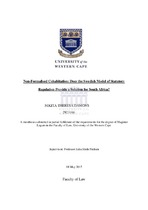| dc.description.abstract | South Africa has come a long way from the rigid family structures which existed in the past. This is demonstrated by the recognition afforded to couples in same-sex relationships as well as those in customary marriages. Proposals have also been set forth regarding law reform to protect the rights and interests of those involved in domestic partnerships. The Domestic Partnership Bill was promulgated in 2008 but to date has not been passed into law. The ensuing consequence is that cohabitation relationships are therefore self-regulated. This relationship has no legal status as a union in South Africa. The court have, however, recognised that a universal partnership could be established if certain criteria are met. Furthermore, heterosexual couples are now also recognised as a "dependant" in actions against the Road Accident Fund for loss of support as a result of death of the breadwinner.
Unlike South Africa, cohabitation in Sweden is regulated by a dedicated law called the Cohabitees Act 2003. The Act provides comprehensive protection than that afforded to cohabitants in South Africa. It offers a clear definition of cohabitation and criteria in order to qualify as a cohabitee. The Act, further, regulates the proprietary consequences of entering into such a relationship and the effects of termination. Cohabitation has status as a legal union in Sweden. My research will deal with non-formalised cohabitation and a comparison shall be made between the current systems in South Africa and Sweden. My work will suggest that the
statutory model of regulation in Sweden may provide a solution for South Africa. In South Africa, cohabiting couples are not afforded the same rights as married couples. In contrast, married couples are afforded rights automatically as a result of the institution. Unmarried partners have no automatic duty of support, to acquire an interest each other's separate property and a cohabitee may not inherit intestate from the estate in the event of death of one of the partners. In Sweden, intimate relationships are treated similarly to married relationships, with the law applying the principle of "neutrality" with regard to its family laws. Several cases have emerged recently in South Africa which will provide a clearer understanding of the current state of the law. The reason for undertaking this study is to illustrate the changing mores of society and the necessity of the law to keep up with these values. As South Africa has not yet passed its domestic partnership law it may be useful to compare it to Sweden in order provide South Africa with a possibly better approach. Sweden has passed laws on cohabitation and these have been in place for years. Thus we might still learn from them prior to our law being passed. Legislative and judicial activity have soared recently and it may be beneficial to look
at another jurisdiction more carefully. These observations will be undertaken more
comprehensively in the body of the thesis. | en_US |

